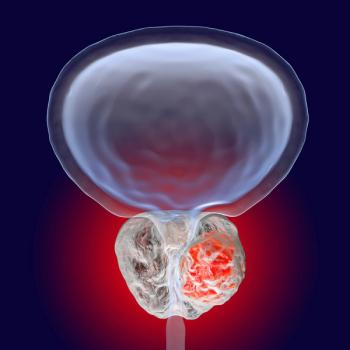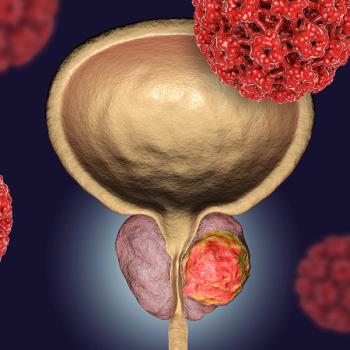
AI-driven decision support can ease oncologists’ workloads and streamline care without reducing autonomy.

AI-driven decision support can ease oncologists’ workloads and streamline care without reducing autonomy.

In the phase 3 SURPASS-ET trial, ropeginterferon alfa-2b outperformed anagrelide as second-line therapy for high-risk essential thrombocythemia.

Lutetium Lu 177 dotatate was linked with partial responses in patients with metastatic bronchopulmonary neuroendocrine tumors, per real-world data.

Adding ivonescimab to chemotherapy improved PFS for patients with EGFR-mutated non–small cell lung cancer after treatment with a third-generation TKI.

The combination of apalutamide to carotuximab showed early signs of tolerability in patients with metastatic castration-resistant prostate cancer.

The addition of bevacizumab to capecitabine produced favorable efficacy and safety data for older patients with metastatic colorectal cancer.

Treatment-related adverse effects were reported in 97.2% of heavily pretreated patients with uterine serous carcinoma taking adavosertib.

Cretostimogene grenadenorepvec showed complete response across subgroups in patients with high-risk BCG-unresponsive non-muscle invasive bladder cancer.

Apalutamide decreased risk of death in mCSPC by 23% and 26% compared with enzalutamide and abiraterone acetate, respectively.

Early infection incidence in patients with multiple myeloma following treatment with cilta-cel infusion highlights the necessity of toxicity monitoring.

Assessing the signs and symptoms of chemotherapy-induced diarrhea and providing accurate and timely patient education may reduce complications and optimize survival outcomes.


Palbociclib plus letrozole lengthened PFS vs placebo plus letrozole for patients with ER-positive advanced or recurrent endometrial cancer.

The FDA has accepted the resubmission of a BLA for odronextamab for the treatment of patients with relapsed/refractory follicular lymphoma.

AUTX-703, a novel, oral KAT2A/B degrader, has received fast track designation for use in relapsed/refractory AML.

Patient-reported outcomes were consistent between patients with RCC using tivozanib/nivolumab and tivozanib monotherapy according to study findings.

Patients with relapsed ovarian cancer who had germline or somatic BRCA mutations saw greater OS with olaparib, according to data from the LIGHT trial.

Baseline ctDNA presence was associated with larger tumor size and higher residual disease burden scores following neoadjuvant endocrine therapy in HR-positive, early breast cancer.

High-grade immune-related adverse effects occurred in 18.9% of older patients with early-stage breast cancer treated with immune checkpoint inhibitors, according to a multi-institutional study.

Second-generation BTK inhibitors exhibited a significantly lower incidence of cardiac adverse effects in B-cell malignancies, according to a meta analysis.

Sacituzumab tirumotecan had antitumor activity in pretreated advanced endometrial and ovarian cancer, data showed.

Lenvatinib, pembrolizumab, and TACE outperformed placebo plus TACE in progression-free survival for intermediate-stage hepatocellular carcinoma.

Oral azacitidine had a similar safety profile across the 200-mg and 300-mg groups in lower- to intermediate-risk MDS.

The FDA has approved idecabtagene vicleucel for patients with relapsed/refractory multiple myeloma who have received 2 prior lines of therapy.

After radical prostatectomy, patients with prostate cancer treated with abiraterone acetate plus prednisone and apalutamide had improved outcomes without a significant impact on their health-related quality of life.

The major molecular response rate for asciminib at week 156 continued to be higher than with bosutinib.

Published: January 31st 2025 | Updated: June 30th 2025

Published: January 31st 2025 | Updated: June 30th 2025

Published: September 12th 2025 | Updated:

Published: May 1st 2025 | Updated: